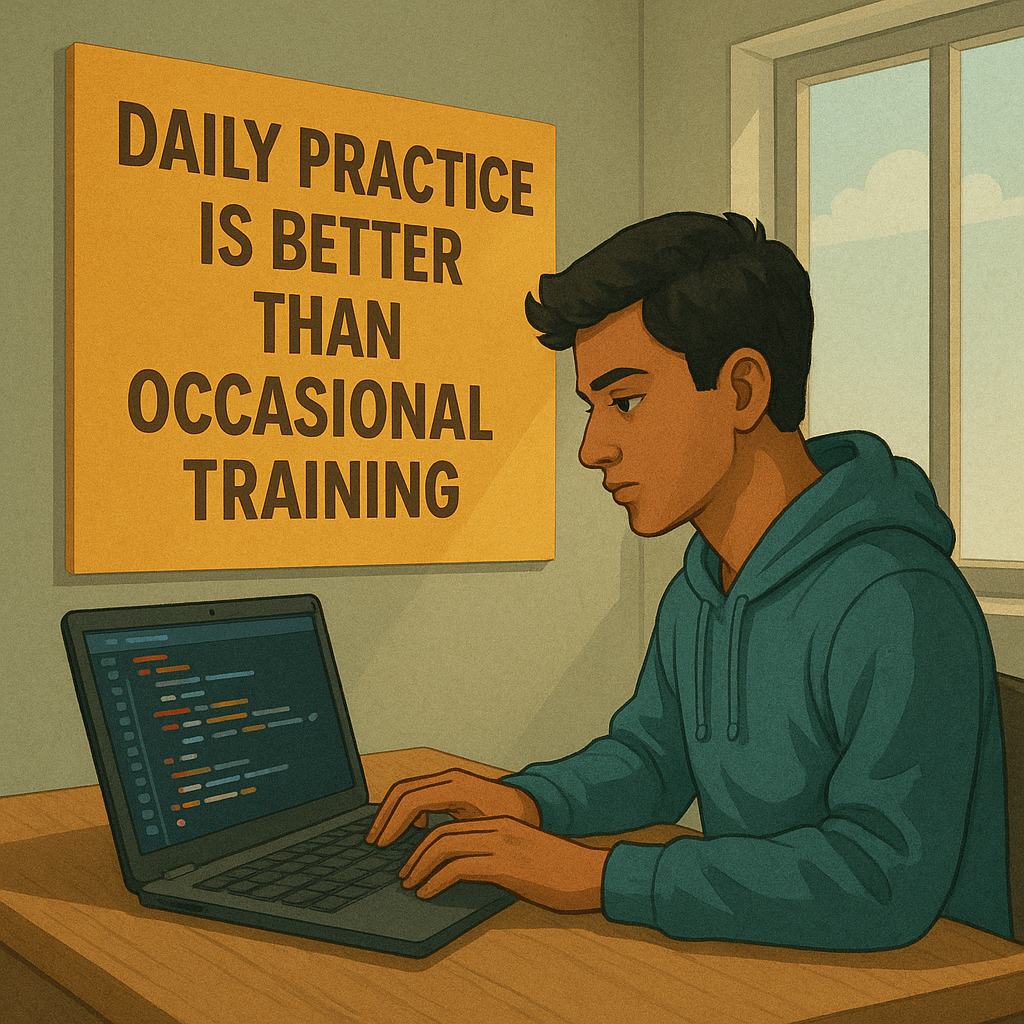👨🏫 From Village Roots to Industry Leader | Gurjeet Kamboj's Mission to Fix IT Training in India

Gurjeet Kamboj at TechCast – Breaking myths around IT education in India
Mr. Gurjeet Kamboj shares the harsh realities of India's IT training ecosystem — exposing fake institutes, glorified certifications, and the gap between degrees and employability. He reveals how hands-on training, ethical mentoring, and live projects are transforming youth from small towns into globally-paid professionals.
Meet Mr. Gurjeet Kamboj, founder of Himal Infotel Pvt. Ltd., who left his government faculty job to build a company focused on real skills over shiny certificates. With over 20,000 students trained, he offers priceless insights into freelancing, IT careers, and how even 10th and 12th pass students can earn ₹70,000+ with the right approach.
🎯 Key Takeaways from This Punjabi podcast:
- 💻 Skill Over Degree: Why practical skills matter more than marks or certificates
- 🚀 Live Project Training: How real coding experience prepares students for jobs
- 📉 Fake Training Exposed: Inside the shady business of certificates without learning
- 🌐 Freelancing & Global Work: Earning in dollars from India via Upwork & remote tech jobs
- 📊 IT Career Scope: What tech stacks (Full Stack, AI, Laravel) are in high demand today
- 💬 Motivation for Youth: Gurjeet's personal advice to students from rural or non-IT backgrounds
💻 Why Practical Knowledge Beats Certificates

Many students hold certificates but lack the real skills needed to succeed
In the fast-paced world of IT, Gurjeet Kamboj points out a harsh reality — thousands of students walk into job interviews with impressive-looking certificates but walk out empty-handed. Why? Because they never learned how to actually *do* the work.
He shares that too many institutes prioritize selling certificates over delivering real training. These students often realize the truth only when it's too late—when they can't answer basic technical questions in interviews or perform in real projects.
Gurjeet emphasizes that skills, not paper, land you jobs. A live project, a working prototype, or even the ability to explain your own code is far more valuable than a certificate from a popular but hollow institute.
💡 Key Insight: "The value of training is realized only when you're unable to answer in an interview. That's when fake certificates fall apart."
His advice to students? Always ask for a demo class, question what you'll actually learn, and avoid any institute that takes full payment on day one. Real training builds confidence. Fake training only builds regret.
🚀 Birth of a Training-Centric IT Company

Hands-on coding in progress — training that bridges the gap between classroom and career
After years of watching students struggle to convert degrees into jobs, Gurjeet Kamboj took a bold step. He launched a company that prioritizes *training first* — flipping the traditional model of education. No theory overload. No empty certificates. Just real-world projects and practical skill-building.
At Himal Infotel Pvt. Ltd., students don't just sit through lectures — they build full-stack apps, solve real client problems, and prep for interviews by tackling daily coding questions. From Laravel to AI, from frontend design to backend logic, every student is pushed to *learn by doing*.
💡 Key Insight: "We don't just teach tech — we solve real interview questions daily. Each student must earn their skill through solving problems, not watching slides."
Many of his students begin freelancing on platforms like Upwork even before graduation — earning in dollars while still in college. It's a model that proves one thing: with the right training, India's youth don't need to leave the country to build a future.
💰 Freelancing, Dollar Income & the Myth of Canada

Why leave India? Real income is possible from home — with the right skills
For many young Indians, going abroad—especially to Canada—feels like the only escape from unemployment. But Gurjeet Kamboj flips that idea on its head. He proves that with the right training, freelancing in tech can earn you $20 to $30 an hour — all from a small room in Mohali.
His students, some with just a Plus Two qualification, are working on international projects via platforms like Upwork and Fiverr. They don't need PR, visas, or taxi jobs abroad — they just need real skills and the ability to deliver results remotely.
💡 Key Insight: "Why drive cabs in Canada when you can earn in dollars from Mohali? Learn the skills, not the hype."
Gurjeet emphasizes that the dream shouldn't be migration — it should be empowerment. India doesn't lack jobs. It lacks skill-matching. His model shows that when students are trained practically and ethically, global work becomes accessible — without ever leaving home.
🧑💼 Training with Transparency & Ethics

Monthly payments based on learning — not flashy promises or upfront traps
In an industry flooded with institutes that demand full payment upfront, Gurjeet Kamboj takes a radically different approach. His training model is simple: no long-term lock-ins, no upfront pressure. If a student doesn't feel they're learning, they're free to leave — no questions asked.
This monthly, skill-based fee structure builds accountability on both sides. Trainers must deliver value in every session, and students stay motivated knowing their money supports real growth — not just certificates.
💡 Key Insight: "If I'm not teaching anything, why should a student return next month? Our training must earn trust every single class."
It's not just business — it's ethics. And in an environment where trust in education is fading fast, this transparent model is a breath of fresh air for thousands of young learners.
📉 Fake Institutes & the Glamour Trap
Behind the lights and branding — many institutes lack actual development work
With catchy advertisements, glamorous offices, and overly polite receptionists, some so-called training institutes are fooling thousands of students each year. Gurjeet Kamboj issues a sharp warning: don't fall for the surface shine — look for what's actually being taught.
Many of these institutes have no real projects, no experienced developers, and no outcomes. Instead, they sell dreams using buzzwords and offers, only to leave students unprepared for real-world jobs.
💡 Key Insight: "Madams in makeup don't build your career. Live projects do."
He encourages every student to request a demo class and ask to see real projects. The difference becomes clear instantly — one is a photo op, the other is a launchpad.
🔁 Daily Practice, Real Projects, Real Results

Real growth comes from daily problem-solving — not just watching tutorials
At Himal Infotel, training is not a passive activity — it's a daily challenge. Every student receives structured "cushions" — practical problems to solve — and is supported with doubt-clearing sessions, mentor guidance, and live projects.
This daily rhythm of doing, correcting, and improving prepares students not just for exams, but for real-world interviews. As a result, the company boasts one of the highest placement rates among IT training institutes in North India — with students landing roles even before finishing their courses.
💡 Key Insight: "Our success is not a certificate — it's a job. Without interviews, your training means nothing."
The focus is simple: measurable outcomes. A certificate is just paper — but cracking interviews and getting hired? That's the real proof of learning.
🔍 Full Stack, Python, or Digital Marketing?

Choosing the right path can be the difference between job-ready or jobless
With hundreds of training ads pushing every trending tech, it's easy for students to feel overwhelmed. But Gurjeet Kamboj advises a grounded approach: pick your technology based on real regional hiring trends.
In Chandigarh and Mohali, Full Stack development and SEO dominate the job market. For those eyeing roles in Gurgaon or Bangalore, Python and AI have stronger demand. The key is to research the ecosystem — not follow Instagram hype.
💡 Key Insight: "Pick your tech based on geography and industry need. Not Instagram trends."
 IT Educator & Mentor Gurjeet Kamboj on TechCast Punjabi Podcast
IT Educator & Mentor Gurjeet Kamboj on TechCast Punjabi Podcast